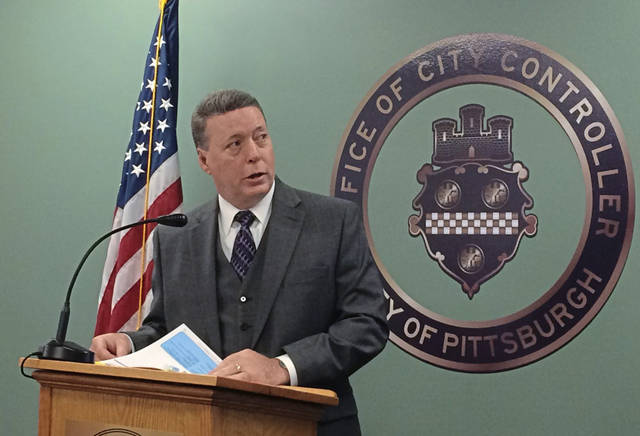Pittsburgh should be able to pull through the coronavirus economic fallout with the help of a significant surplus, but would have to consider massive layoffs in 2021 without assistance from the federal government, the city controller said Thursday.
Controller Michael Lamb briefed reporters through a teleconference on the state of city finances at the end of 2019 and possible ramifications of revenue losses caused by the pandemic.
Lamb said the city ended 2019 with a $133 million unencumbered surplus that should help offset major revenue losses this year. He offered a dire outlook for 2021 without financial help from Congress and the Trump administration.
“If we weren’t to get it, the city could make do to some degree for maybe this year, but once you get beyond that, if we don’t have a stronger recovery, I think you’re talking about the city making the kind of cuts that we had to make back in 2004,” he said. “Remember, we laid off close to 2,000 employees back then. We’d have to reduce our police department, we’d have to reduce fire protection, we’d have to reduce our EMS response.”
The city has about 3,200 employees. Public safety accounts for about 55% of the city’s $608 million budgeted expenses, he said.
Lamb was referring to the last decade when the city was reduced to junk bond status because of chronic deficits, overwhelming debt and a $1 billion employee pension fund deficit. Pittsburgh spent 14 years under state financial supervision, known as Act 47, as a result of its position.
Mayor Bill Peduto has estimated the city is facing a $127 million deficit in 2020 because of dwindling tax revenue. Lamb agreed that the number was “in the ballpark.”
Peduto has repeatedly lobbied the federal government to include funding for municipalities in congressional coronavirus relief packages. Congressional leaders have promised to include cities in the next round of funding.
Lamb said Pittsburgh should recover some lost tax revenue once Pennsylvania approves the reopening of businesses, but described such sources as parking taxes ($59 million), amusement tax ($18 million) and facility usage fees ($5 million) as unrecoverable.
“If the federal aid can replace some of our lost revenues, the city would be fine,” he said. “We’re not talking trillions of dollars. We’re talking about monies that have been lost that can’t be recouped. Some of our monies that we lost over this period of time, we’ll get back.”
Lamb released the 2019 Comprehensive Annual Financial Report, which outlines the city’s financial position as of Dec. 31.
He said tax revenues remained stable and the city ramped up contributions to employee pensions plans and continued a program of “responsible borrowing” for capital expenditures.
The invested pension portfolio increased from $428.5 million to $520 million by year’s end and debt totaled $427.5 million.
Lamb said earned income tax increased by $9.9 million for a $109.8 million total, but payroll preparation and local services taxes decreased by $500,000 and $1.5 million respectively. Payroll preparation taxes totaled $66.2 million and local services taxes $13.8 million.
That indicates people are earning more in the city, Lamb said, but job growth is stagnant.
“It’s a good situation, but it does make you wonder what is happening at the lower end of the economy,” he said. “Overall we had a pretty good year last year.”








